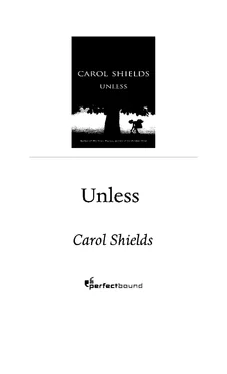Carol Shields - Unless
Здесь есть возможность читать онлайн «Carol Shields - Unless» — ознакомительный отрывок электронной книги совершенно бесплатно, а после прочтения отрывка купить полную версию. В некоторых случаях можно слушать аудио, скачать через торрент в формате fb2 и присутствует краткое содержание. Жанр: Современная проза, на английском языке. Описание произведения, (предисловие) а так же отзывы посетителей доступны на портале библиотеки ЛибКат.
- Название:Unless
- Автор:
- Жанр:
- Год:неизвестен
- ISBN:нет данных
- Рейтинг книги:4 / 5. Голосов: 1
-
Избранное:Добавить в избранное
- Отзывы:
-
Ваша оценка:
- 80
- 1
- 2
- 3
- 4
- 5
Unless: краткое содержание, описание и аннотация
Предлагаем к чтению аннотацию, описание, краткое содержание или предисловие (зависит от того, что написал сам автор книги «Unless»). Если вы не нашли необходимую информацию о книге — напишите в комментариях, мы постараемся отыскать её.
Unless — читать онлайн ознакомительный отрывок
Ниже представлен текст книги, разбитый по страницам. Система сохранения места последней прочитанной страницы, позволяет с удобством читать онлайн бесплатно книгу «Unless», без необходимости каждый раз заново искать на чём Вы остановились. Поставьте закладку, и сможете в любой момент перейти на страницу, на которой закончили чтение.
Интервал:
Закладка:
“Don’t, please don’t. Don’t touch it. Not until we’ve discussed a few editorial ideas. I beg of you. We can make this one of the great books of the new century.”
“But I was trying to —”
“You were trying to write a light comic novel. But you’ve done something quite other.
You’ve made a literary statement, something for future generations of readers, and it would be a catastrophe if you now —”
“What would we have to do?”
“I’ve made a list of things. Here we go. First, there’s the matter of Roman. His role needs enlarging. His interiority. His desire to make a pilgrimage to the land of his fathers. I see this as quite central to the novel.”
“But Alicia is really the focus — I thought you — well, you said you admired her for her goodness. You said that on the phone, remember?”
“Goodness but not greatness. Who said that?”
“Danielle Westerman.”
“Really? I haven’t read the old girl, but I know Mr. Scribano gave her a helping hand at one time.”
“She’s eighty-five. She’s a very well recognized writer. She really is extremely —”
“And I wondered if you would mind terribly making Roman a violinist rather than a trombonist. A violin sounds more serious, as an instrument, I mean, and I don’t think a small thing like that would involve a compromise of your original —”
“Oh, I don’t think I could do that —”
“You’re thinking that he was a trombonist in the first book and so he must remain a trombonist. But if we get ourselves out of the sequel state of thinking, Reta, he can be anything. He could even be the conductor of the orchestra. Or a composer/performer.”
“And Wychwood City —”
“Could easily be re-sited in New York. Or Boston. Chicago? Well, maybe Chicago. Even Toronto, though that would limit its readership —”
“Oh, I don’t think so, not anymore.”
“He suddenly, in mid-life, wants more. He yearns for more.”
“Who?”
“Roman.”
“Oh.”
“I do think we might try to underplay some of the farcical scenes, though they are quite well done. As the no-longer-quotable Woody Allen once put it, the writers of comedy are always asked to sit at the children’s table.”
“But I can’t see Roman as a serious —”
“His parents were immigrants. They sacrificed their language, their cultural roots. Think of that. He somehow got educated, became a musician. He is wonderfully attractive to women, that hair of his, that very physical body, and his ever active brain. His first marriage was a washout, and then he met Alicia, who works in, of all things, the world of fashion. Everything he despises. The marriage must not happen.”
“I absolutely agree with that, the marriage must not happen, but —”
“I am so glad you are in accord with me there.”
“But, really, it is Alicia who sees that —”
“She cannot understand his need to reconnect with his family, his heritage. His real love, of course, is Sylvia Woodall, Sylvia the bassoon player. I recognized what you were up to there, the minute she walked onto the page. Sylvia and her outrageous spirit. She responds to Roman’s need. That need drills straight through the man’s soul. I am talking about Roman being the moral centre of this book, and Alicia, for all her charms, is not capable of that role, surely you can see that. She writes fashion articles. She talks to her cat. She does yoga. She makes rice casseroles.”
“It’s because she’s a woman.”
“That’s not an issue at all. Surely you —”
“But it is the issue.”
“She is unable to make a claim to — She is undisciplined in her — She can’t focus the way Roman — She changes her mind about — She lacks — A reader, the serious reader that I have in mind, would never accept her as the decisive fulcrum of a serious work of art that acts as a critique of our society while, at the same time, unrolling itself like a carpet of inevitability, narrativistically speaking.”
“Because she’s a woman.”
“Not at all, not at all.”
“Because she’s a woman.”
As
“Because she’s a woman,” I said, and at that moment three things happened more or less simultaneously. Arthur Springer lifted his arm in polite protest, and in so doing, knocked over the bottle on the coffee table, drenching the morning newspaper with red wine — an almost holy spreading stain, though luckily there wasn’t much left — and scaring Pet out of his skin, so that he skittered backwards and sideways on the hardwood floor, landing in a corner behind the little glass table, where he lay, panting and shuddering with his face buried in his paws.
At that moment Natalie and Chris came in through the front door. They were loud and noisy, more big-footed than usual it seemed to me, scrambling out of their boots and throwing their books onto the hall floor. “Kronk City,” I heard Chris shouting, and then the two of them were laughing themselves sick over something to do with our neighbour, Willow Halliday, who had kindly driven them home when they’d missed the school bus and when Tom failed to show up.
I was about to introduce them to Arthur Springer when I was distracted by the ringing of the telephone. I left Arthur to mop up the spilled wine with his handkerchief — a white linen handkerchief, I noticed out of the corner of my consciousness, you don’t see people with real handkerchiefs very often. Pet followed, right at my heels, into the kitchen, and pressed his quaking side against my leg.
It was Tom on the phone. “Where are you?” I said.
“There’s nothing to worry about, everything’s fine.” He said this so quickly that I knew something was terribly wrong.
“But —?” I sank into a chair.
“But it’s Norah, she has pneumonia, she’s going to be fine, she’s sleeping right now, but
—”
“Where is she?” I couldn’t get my breath out.
“In Toronto General. They’re taking excellent care of her and she’s responding beautifully.”
“I’ll come right away.” I was thinking fast. “It’ll take me an hour.”
“I’ll be waiting in her room. It’s 434, the West Wing. Unfortunately, there were no single rooms available —” That doesn’t matter, that doesn’t matter.
“Drive carefully,” he said sharply.
“Put your coats back on,” I said to the girls, speaking with the same sharpness. “Norah’s in the hospital with pneumonia. Your father’s with her right now.”
To Arthur Springer I said — I’m not quite sure what I said. Something about an emergency. I would have to leave at once. (Already I had my coat on and was scrambling for my boots.) I uttered something hurried and hostessy into his ear, something like: stay as long as you like, make yourself at home, there’s food in the fridge, pasta, that white bowl with the plastic wrap on it, it just needs heating up, there’s more wine in the cupboard, plenty of firewood, I have no idea when we’ll be back.
I wasn’t worried about him, not one bit. We were on the road in no time, Christine in the back seat, Natalie sitting beside me, up front. We drove as fast as I dared on the dark icy road, first into Orangetown and out the other end, then onto the highway with its uneven glare, heading south. The pink haze that was the city of Toronto lay before us in the distance. The traffic was going to be heavy at this hour. We were mostly silent, the three of us. We never thought about Mr. Springer, we never considered his comfort or convenience for one minute.
We forgot Mr. Springer completely; we forgot my mother-in-law too, and only found out later what became of them.
He did make himself at home. He did open another bottle of wine. I keep the corkscrew in an unlikely spot in the dining room, behind a beautiful piece of local pottery, but he found it nevertheless. Then he must have looked around for the television. It was six o’clock, time for the Lehrer NewsHour. There! He found the TV, in the den. And there was the remote, where it almost always is — on the little side table. He probably settled down in the big corduroy wing chair with his glass of wine and thought: My God. Why am I here? How on earth did I get to this place?
Читать дальшеИнтервал:
Закладка:
Похожие книги на «Unless»
Представляем Вашему вниманию похожие книги на «Unless» списком для выбора. Мы отобрали схожую по названию и смыслу литературу в надежде предоставить читателям больше вариантов отыскать новые, интересные, ещё непрочитанные произведения.
Обсуждение, отзывы о книге «Unless» и просто собственные мнения читателей. Оставьте ваши комментарии, напишите, что Вы думаете о произведении, его смысле или главных героях. Укажите что конкретно понравилось, а что нет, и почему Вы так считаете.












